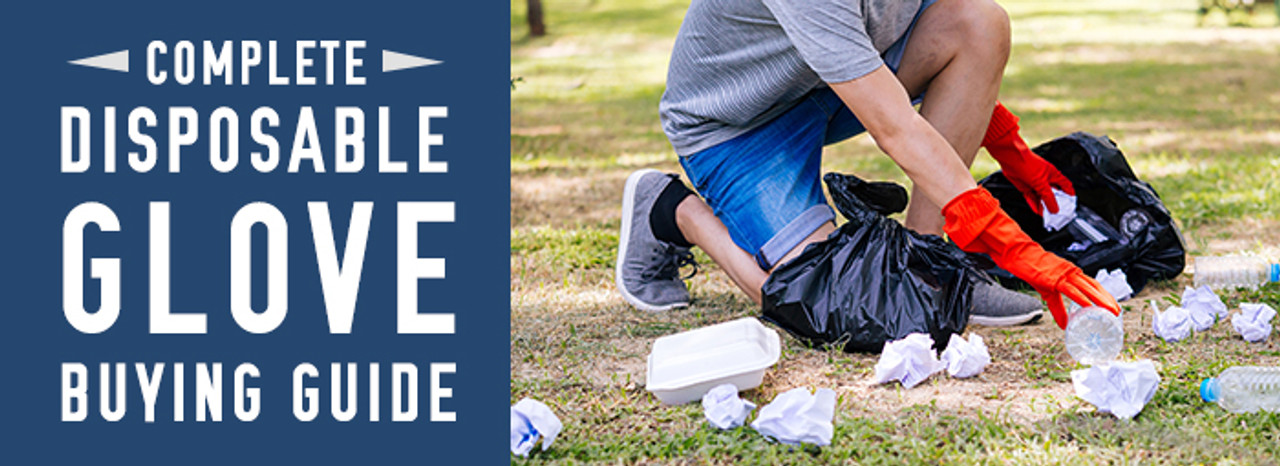If you’re reading this article right now, you might not be aware that there are different types of disposable gloves, and that those gloves are designed for specific jobs. It’s not one-size-fits-all in the disposable glove world, and we’re here to help you find the right gloves for the right applications.
What makes us the experts? Naturally, as vendors of waste disposal receptacles and trash cans, we know a thing or two about the right way to handle hazardous materials. Read on for an overview and to learn more about getting gloves that are a perfect fit.
How to Find The right glove for job
Finding the right types of gloves to suit the job at hand is essential for anyone who’s purchasing gloves in bulk, or needs to find the right material for a specific job. Here are some common uses for disposable gloves, and the types of gloves that are commonly used in those environments. Basically, you need to determine how much wear and tear the gloves are going to see, and whether or not they need to be rated for medical use.
- Industrial - If you’re doing any sort of high-risk activity, going for gloves that are 8 mils thick and are 12 inches in length is generally a good idea. General purpose disposable gloves are used in a variety of industrial environments, including the automotive industry.
- Medical - You want exam-grade gloves for medical, dental, and EMS work, as well as for other areas like law enforcement and tattooing. Usually exam-grade gloves are 4-6 mils thick and around 9 inches in length.
- Food Service - Food service gloves can be general-purpose. Just making sure that they’re kept in a cool, dry place to ensure that they’re not getting any sort of food-borne contaminants or anything like that.
Common Materials and Types of Gloves
- Natural rubber latex - Natural rubber latex is made from a milky fluid that comes from the rubber tree (didn’t know about rubber trees? Check it out.) This fluid is mixed with several other chemicals to produce latex, which creates a durable and form-fitting glove that’s perfect for jobs that require both protection and dexterity. Unfortunately, latex allergies are common, and can range from skin irritation to full anaphylaxis. It’s best to have both available in a work environment, just in case you have users that might have this allergy.
- Nitrile - Nitrile is an excellent alternative to latex. Being an entirely synthetic compound, it’s allergy risk is extremely low, and it possesses many of the same properties as latex, so it’s common for many places to completely replace their supply of latex gloves with nitrile gloves.
- Vinyl - Most popular in the food industry where touch sensitivity isn’t a requirement, vinyl gloves offer a durable and cheap glove material that is safe and hypoallergenic.
Getting the right sizes
To ensure that you’re getting the right sizes of glove, knowing the style and brand of the gloves you’re buying is very helpful, as different ones will have different fits. How do you measure your hand for gloves? Measure the width of your dominant hand. Here’s a chart that can help you estimate, but if you’re an employer providing these as safety equipment, ensuring that there’s proper distribution of different sized gloves is a must. If you’re looking for a nitrile glove thickness chart, you can find one of those here.
Good products to start with
Looking for the best disposable gloves? Look no farther.
- Curad Latex Gloves - These medical latex gloves are textured and powder free. They slide easily onto hands in spite of the fact that they don’t have any powder, and they’re super comfy too. With these latex gloves, you’ll have freedom of motion in your hands, and they’re well suited to medical use, as well as any other application you might find, though they are a bit more expensive.
- GlovePlus Vinyl Gloves - Cheap cheap cheap! That defines these kitchen gloves for cooking, and while they’re less elastic than other types of gloves they’re perfect for industrial and food applications where medical safety and high degrees of dexterity aren’t required. They’re also the best disposable gloves for cleaning, where dexterity isn’t needed.
- The Safety Zone Nitrile Gloves - Latex allergies a no-go for your employees? Go nitrile. These are the best latex free gloves are perfect for medical or food applications, and fit naturally and easily over hands, with great levels of flexibility. These might be some of the best nitrile gloves for mechanics, and they’re food grade nitrile gloves too.
Do you have a favorite type of glove? No matter what the job is, it’s key to understand that theirs a glove for the job!

